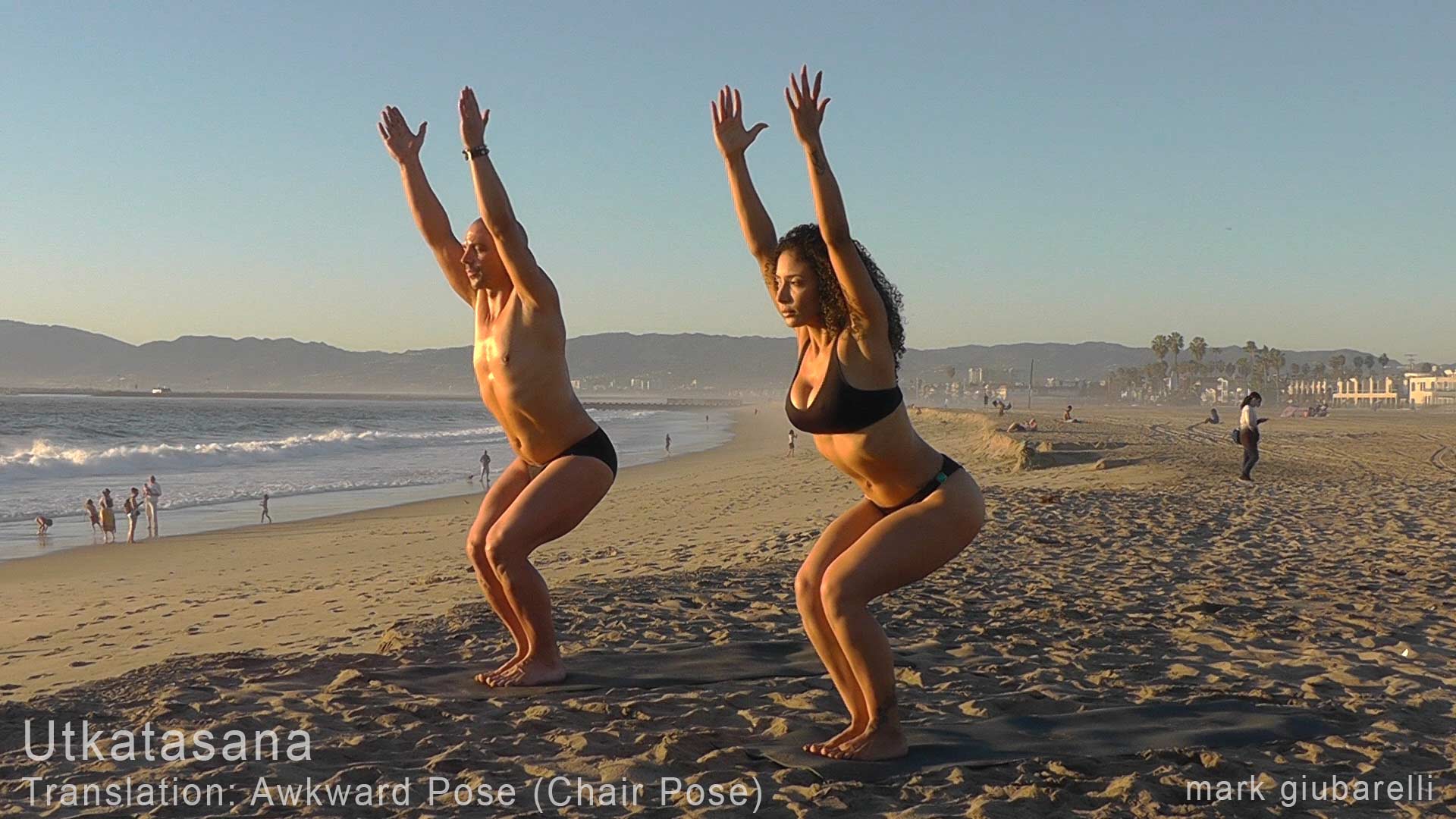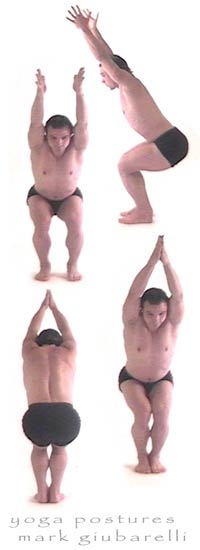A great source for Yoga Postures by Mark Giubarelli.

Utkatasana
Translation: Awkward pose known also as the Chair Pose
From a standing position, with the legs together or hip width apart, slowly  bend the knees.
bend the knees.
![]()
Stretch the arms up over the top of the head. Clasp the hands together or keep them shoulder width apart.
This is a good yoga posture to strengthen the quadriceps and knees.
![]()
If you have a knee problem be careful. Don’t bend the knees beyond the point of mild discomfort.
![]()
This is an excellent yoga posture to do in the Sun Salutations especially if you have low back problems. Entering a mild Chair Pose (Less than the on the way up and the way down will greatly relieve pressure and tension around that area. It may mean the difference between your lower back feeling good or the lower back being aggravated.
![]()
Tips
Try placing something under the knee or above it on the leg that is on the mat if your knee is injured or uncomfortable. Hyper extend the knee that is bent in front of you. Relax forward and the knee is stretched, the posture may be more comfortable.
![]()
It is hard to stabilize the muscles on the inside and outside of the knees. If you prefer add some distance between the feet. It is easier to evenly distribute the weight over the feet when this is done. The feet can be taken as wide as hip width apart.
![]()
Benefits
This pose increases strength, balance and stability. The Hamstrings, quadriceps, gluteals, and the erector muscles of the back are exercised and strengthened. The erector muscles contract isometricly to keep the normal curvature of the spine.
![]()
The anterior lower leg muscles get toned. These include the tibialis anterior, extensor halluscis longus, extensor digitorum longus, and peroneous tertius. This group of muscle primarily extends the toes and dorsiflexes the ankle and are used for balance and stability.
![]()
Muscles in the arms and shoulders are toned and strengthened. These include the deltoid group, triceps, a little biceps the Trapezius Muscles (Middle and lower), Rhomboids and Latissimus Dorsi. Shoulder elevation also involves glenohumeral movement in combination with scapulothoracic movement and thoracic extension.
![]()
![]()
Vinyasa Yoga postures to transition from and to:

![]()

![]()

![]()

![]()

![]()

![]()

![]()

![]()

![]()

![]()

![]()

![]()

![]()

![]()

![]()

![]()

![]()
![]()
Tadasana (Standing) and almost all the standing yoga postures, Trikonasana ![]() Uttanasana
Uttanasana ![]() Parivrtta Trikonasana
Parivrtta Trikonasana ![]() Parsvakonasana
Parsvakonasana ![]() Revolved Lunge
Revolved Lunge ![]() Virabhadrasana 1
Virabhadrasana 1 ![]() Virabhadrasana 2
Virabhadrasana 2 ![]() Urdhva Virabhadrasana
Urdhva Virabhadrasana ![]() Virabhadrasana 3
Virabhadrasana 3 ![]() Ardha Chandrasana
Ardha Chandrasana ![]() Parivrtta Ardha Chandrasana
Parivrtta Ardha Chandrasana ![]() Anjaneyasana
Anjaneyasana ![]() Anjaneyasana2
Anjaneyasana2 ![]() Adho Mukha Svanasana
Adho Mukha Svanasana ![]() Bhuja Vrischikasana
Bhuja Vrischikasana ![]() Bakasana and many other standing postures not mentioned.
Bakasana and many other standing postures not mentioned.
![]()
Yoga Teacher Tips
Be careful not to aggravate knee problems. Always allow the student to choose the depth to come to and encourage deeper boundaries with wisdom and grace.
Try many different arm positions if it is uncomfortable to have the arms as shown. Offer variations.
![]()
“These tips apply to safety and comfort in practice. The first rule of healing is, do no harm.”
![]()


